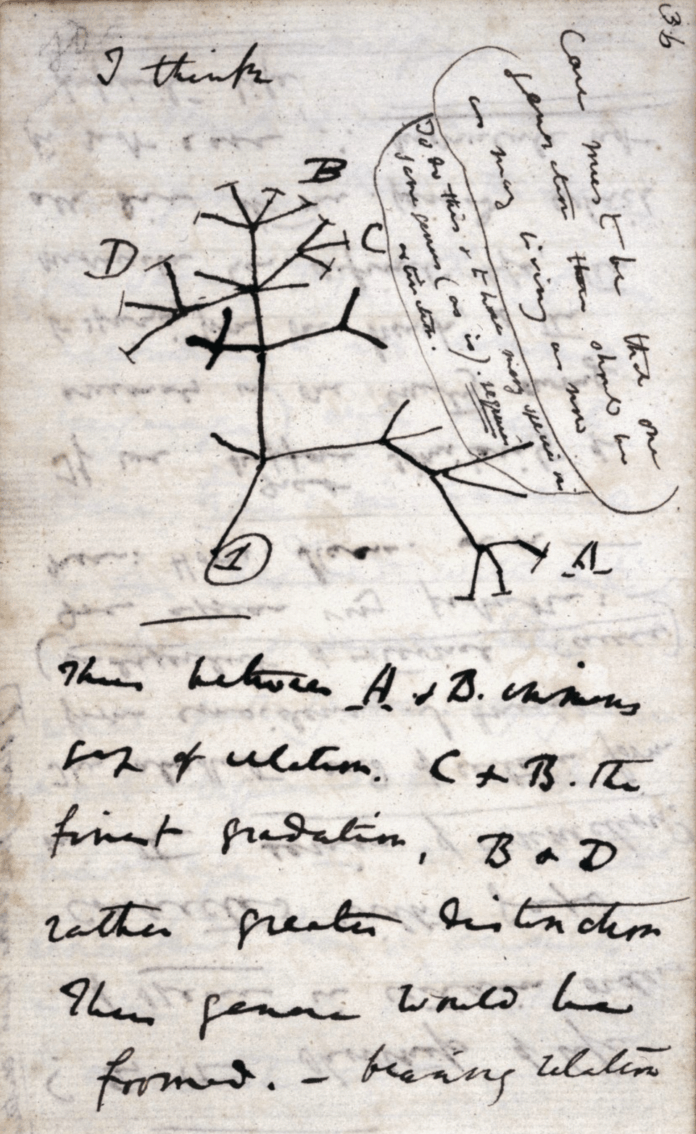
In response to Catholic Insight’s post of Carl Sundell’s list of 39 essential questions Catholics should be prepared to answer about our faith, I have been responding to them one-by-one to equip you with clear, concise and (hopefully) well-reasoned answers to help you grow and share your Faith.
None of these answers can be conclusive. They simplify answers and provide a framework to approach these questions. You can find links to previously published articles in this series at the bottom.
8. How do you answer the view that the theory of evolution has made God unnecessary?
For this version I want to reprint an essay that I wrote to stand alone, but I believe addresses this question in a fitting way:
Even Evolution Can Be Instrumental to God’s Will
I wish I was better at playing the piano. Let me rephrase that, I do not just wish I was better at playing the piano, I wish I could play the piano at all. There is technically at least some potential within me to play the piano, but I have not actualized that potential. While this desire in me may be very great, it would pale in comparison to the actual result of music being played. Even if I could read and compose music expertly and “hear” the music in my head, it would require the piano itself for the beauty of the music to become a reality.
This metaphor is not accidental, for many mythologies, including that of J.R.R. Tolkien surrounding his Creation of Middle Earth, includes music. Music signifies in exemplary fashion, the notion of the result being greater-than-the-sum-of-its parts, for the unity between the sounds along with the individual notes themselves adds another layer of beauty. In the Christian story of Creation, there may not be literal music playing in the opening chapters of Genesis, but there is certainly a symphonic element in its presentation. Our Author lays the foundations in days one, two and three, then fills each appropriate foundation with its corresponding parts in days four, five and six respectively. This story points to an order that is directed toward a certain end, or telos, which could also be described as its purpose.
Christians would have no issue accepting that Creation is ordered and directed toward an end or purpose, especially if that purpose is ‘rest’ in God as Genesis describes. These same principles, as well as the instrumental causes that are used to bring them about, can help a Christian reconcile the possibility of evolution with the certainty of God and His essential role in Creation.
Let me clarify right away and say that this is not a science article for or against evolution. Obviously, those articles have their place in this conversation, but my argument actually goes underneath the scientific conversation about evolution, and deals with the presuppositions that many scientists hold when engage in that conversation.
The philosophical question is whether belief in God is compatible with a belief in evolution, before one even gets into the evidence for or against evolution itself. This compatibility will affect how they form any experiment they conduct as well as any conclusion they draw from the results.
I used the example of music above because it illustrates very well the concept of instrumental causality as well as the principle of causality in regards to potency and actuality.
A very brief note on these:
First, instrumental causality is the relationship between cause and effect that distinguishes between the primary, efficient cause and any number of secondary, instrumental causes. These instrumental causes do not necessarily follow the primary cause chronologically, but are secondary because of their reliance on the primary to act as causes. They are also instrumental because they are used by the primary to produce the effect. They may be necessary to the primary cause in order to produce the effect, but this depends on the nature of the primary cause.
Second, the effect cannot be greater than its cause. There is some ambiguity concerning the term “greater”, as this can imply a result that is more powerful, more fully formed, etc. Understanding the potency found within a cause, however, implies that it can be produce a so-called, greater effect in its actuality, as in a new species via the process of evolution.
Both of these concepts are not foreign to the physical sciences, especially biology. Every organism has required something, even if it was not another someone, in order to reproduce, which would act as an instrumental cause of generation. Every organism had to have the potential to grow into adulthood built-in to its genetic code even when it was one cell. While these concepts are essential to any philosophy of science, be it Christian or not, they are also principles that any Christian can use to reconcile belief in God as Creator with the process of evolution.
For example, God is shown to operate through human instruments throughout the Old Testament and New, working through the prophets to communicate His will to Israel, and using various kings and judges, Israelite or not, to act as instruments of his justice. Accepting the historic and traditional understanding of Jesus as divine, He still had a human nature in which his passion and death brought about human redemption. God also shows the “greater” effects from causes. Forming a human from the ground, or another human from a rib are both examples of “greater” effects from less great causes. Making the Messiah come from “the seed” of Genesis 3:15 is another much greater effect than its cause. It is only by accepting a degree of potency within each of those that a Christian could accept that premise.
On a more proximate level, we too become the instruments of God’s grace in our own and other people’s lives. Christians of every tradition agree that it is God’s grace that saves them. This grace is not imposed upon us against our will, but presented to us for our acceptance or rejection. Nor was this grace, for most Christians in history, directly given by God but introduced to us through any variety of human instruments. This includes the Bible itself, which is a product of human cooperation with God’s will.
Taking all of this into account, what if evolution is just another instrument through which God, the primary, Efficient Cause works? Not only are the generations of creatures their own instrumental causes, but the process itself is an instrumental cause. This is possible because, like the Genesis account of Creation shows us, there is an order and direction to Creation. Evolution, too, has a similar order and direction. While some refer to the mutations in species as “random,” this is simply a matter of limited perspective. It is only random until one discovers the purpose, or telos, of the change. Now consider, not only must evolution itself be ordered toward the telos of life, but every individual creature must cooperate in the order. Every biologist, Christian or non, would agree that the features of animals are ordered toward a certain end, which is survival of the individual or the species.
This is obviously not done on the conscious level as it is the instinct to live and procreate by which non-rational plants and animals act, but this makes it no less cooperative. Though we have similar instincts to survive and procreate, we also have the will to discern the greater spiritual purpose God has designated for us. Animals cooperate simply in an analogous way to us humans, ours being by our own free will with the grace that is offered to us by God to fulfill our purpose in serving Him.
This notion of ‘potency within a predecessor’ – or prior cause – does not imply, say, that the DNA for the whale was somehow hidden inside its proposed land-dwelling ancestor. But what if the capacity for adaptation was coded into that DNA? This would allow for the potential of any change necessary for survival while respecting the individuality of the original species. While the effect of a whale may seem much “greater” than its ancestors the further back one goes, for the evolutionary biologist one could go back to a single cell organism of some kind, this is only because the “greater” cause within the cell was “greater” because it carried within it the potential for adaptation, which would eventually become actualized in the effect of the whale.
Again, none of this proves that evolution happened or did not happen. However, these questions are important to consider, as they shape how one collects and interprets data, and follow-up conclusions. Philosophy is not just a tool for reconciling faith and reason, but is also an invaluable tool for reconciling perceived conflicts between the Bible and evolution.
This matters for the non-Christian biologist struggling to reconcile the Bible and evolution in order to accept the reasonability of Christianity, and it also matters for the Christian non-biologist who seeks to view all of reality through the mind of Christ. Jesus is not only the one who reconciles God and humanity, but integrates all of Creation to Himself (cf John 12:32). If evolution is true according to the physical scientific evidence, if it really reflects this part of reality, then it too must be integrated into and viewed through this lens. It certainly creates a more symphonic view of nature and super-nature.
Maybe someday I will dedicate the time, attention and energy to become semi-proficient at the piano. It will take a lot of cooperation with a cause much greater than I, and the effect proportionate to what potency is latent and brought out.
Want to catch up on the previous questions? You can find parts one, two, three, four, five, six and seven (please include link to part five once it is live) here!











